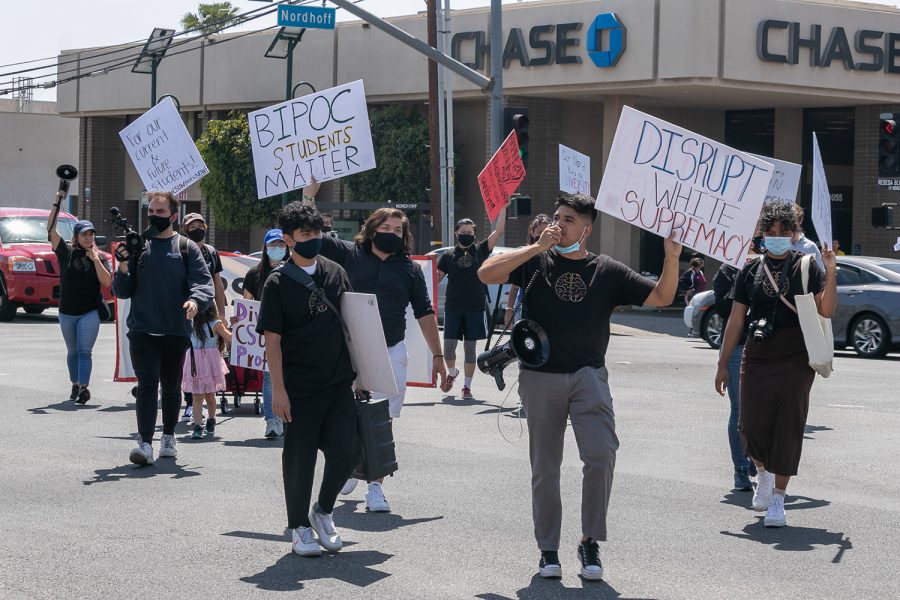Students rally to diversify hiring of CSUN professors
Colored Minds Inc. protesters block the intersection of Reseda Boulevard and Nordhoff Street in Northridge, Calif., on Saturday, April 17, 2021, to bring attention to their cause.
May 11, 2021
What do “Black Lives Matter,” “Stop Asian Hate,” “No Kids in Cages” and “Diversify CSUN Professors” have in common? According to Colored Minds Inc., they all stem from white supremacy.
Colored Minds Inc., the student-led organization that seeks to diversify faculty at CSUN, held a public demonstration on April 17, in support of dismantling systemic inequalities and disrupting white supremacy.
During the two and half hour rally, the grassroots coalition discussed their demands to diversify CSUN faculty, featured guest speakers, held a moment of silence for CSUN student Quinten Thomas and marched around the streets of CSUN’s campus.
CMI created a petition in January that calls for CSUN to hire more professors of color. The group is demanding that CSUN enacts a hiring search for a diverse pool of candidates and that the university allows college deans to make multiple hires when the top candidates are racially and ethnically diverse. The group is also demanding that faculty of color can serve on hiring search committees across any departments that lack faculty members of color.
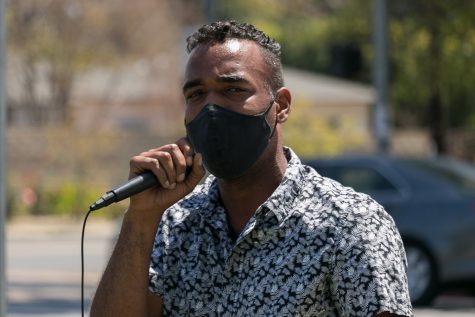
Anthony Bryson, a local community activist in attendance at the rally, shared his experience within higher education. Bryson studied molecular biology at Cal State Long Beach but said it became difficult for him to manage school and his livelihood. He said he didn’t have representation on campus that he could identify with and decided to pause his education to focus on survival as a Black man in America.
Bryson, who will run for California’s 47th district in 2022, said more than ever, there is a dire need to root out white supremacy and he encouraged others to practice globalization rather than isolation.
“When the white supremacy perpetuates, we isolate our borders, we isolate within our communities, but it’s time that we break barriers, break borders, come together across cities across states, across counties and unite,” Bryson said.
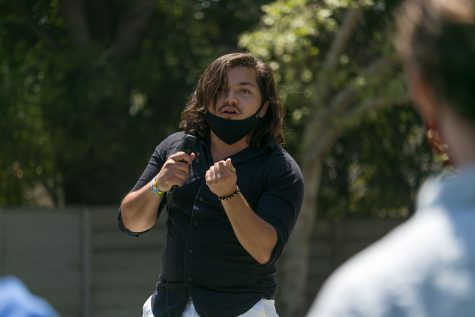
“We are fighting — not to tear things down, not because we have a vendetta … because we are trying to build a world where all of us truly matter and have representation, with respect, and the dignity that we deserve,” said Sebastian Cazares, a trustee of Santa Clarita Community College District Area 3.
Cazares, who is named the “youngest-ever elected official on record in Los Angeles County,” was one of the guest speakers in the rally and encouraged the small crowd to continue to recognize their power and potential in the fight to dismantle inequities.
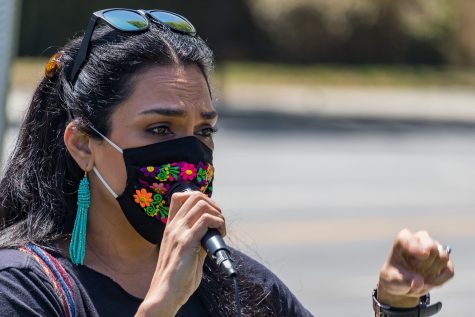
Angelica Dueñas, a progressive Democrat running in California’s 29th Congressional District, said she became an activist out of necessity because she saw injustices within her community in the East San Fernando Valley. Dueñas said that with a small group of volunteers and their organizing efforts that gained less than $80,000 in campaign funding, she was able to earn 43.4% of the vote against U.S. Rep. Tony Cárdenas, D-Calif., during the November 2020 election. She said these results are a testament to the power of grassroots advocacy.
Dueñas also said the university system has been taking advantage of adjunct professors of color who typically work on a part-time basis and do not have the full benefits as their full-time counterparts. Dueñas said diverse faculty in higher education should be a baseline and not a minimum. She said the University of California and California State University systems should be advocating for diversity within themselves.
“For you guys to be out here and having to ask for it, that goes to show that they’re not doing their job,” Dueñas said. “So don’t let them tell you that you’re asking for too much.”
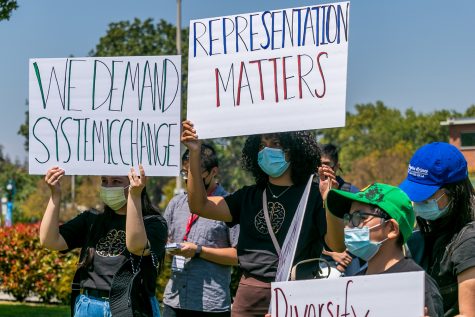
After creating the petition and holding virtual rallies, CMI met with Natalie Mason-Kinsey, CSUN’s chief diversity officer, on Feb. 5. However, they were met with a roadblock as Mason-Kinsey explained she does not have control over the hiring process. The setback prompted CMI to call a meeting with the provost and vice president for Academic Affairs, Mary Beth Walker, on March 17.
During the meeting, CMI spoke to Walker about their demands and pleaded their case. Walker told CMI that she does require hiring searches to contain a diverse pool of candidates.
Walker informed CMI that there had been two recent faculty appointments to act as equity advocates for recruitment and retention for the office of Faculty Affairs on a part-time basis. Sylvia Macauley, professor and special assistant to the dean, and Elena Miranda, a geology professor — both faculty of color — will focus on reviewing CSUN’s current recruiting and hiring practices, identifying areas to foster inclusivity and equitable outcomes. The pair will also consider retention rates for faculty of color and recommend evidence-based practices that will lead to retaining individuals from underserved groups.
“Professors Miranda and Macauley are well suited to take on this new role as they both have a passion for this work. We trust that their efforts will have a meaningful and sustained positive impact on the institution,” said Diane Guido, associate vice president of Faculty Affairs.
However, CMI points out that these individuals do not have the authority to enact change, which is not enough.
CMI had a follow-up meeting with Walker for May 5. The administration plans a more deliberate approach for hiring from a diverse pool of candidates, however, the details of the process have not been outlined. Walker said the administration hopes to share the results of their analysis of the current hiring policies and practices, along with some recommendations to improve the recruitment and retention standards going forward.
“We share their sense of urgency on this important issue and agree with their statement that students in every discipline should have the opportunity to learn and be inspired by diverse faculty,” Walker said.
CMI expects an official response from the administration by July 5.
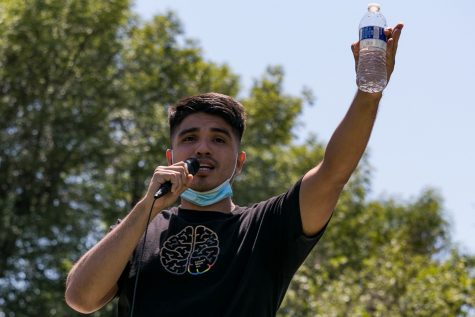
Founder of CMI and CSUN graduate student Daniel Garcia said the meetings with the university’s administration have lacked transparency. He said CSUN is not doing enough to show how they will battle the lack of diversity among faculty. His perspective is that the university keeps telling them what they cannot do instead of what they will do. Garcia also pointed out that it is not the responsibility of students to find a solution to the problem.
Currently, 56.9% of tenured faculty at CSUN are white and according to Garcia, this indicates that the university is operating within a white supremacist structure.
“We went from one white president to another and what do you call it when most of our education is white-centered? What do you call it when white administrators of faculty are funneling money out of Black and brown communities? What do you call it?” Garcia said. “You call it, ‘white supremacy.’”
Garcia said that CMI’s goal is about more than just diversifying CSUN professors but they also want to wake people up to disrupt white supremacy and take meaningful action through protests, organization and voicing their opinions. He said everyone talks about ‘Black Lives Matter,’ ‘Stop Asian Hate,’ and ‘No Kids in Cages,’ but rarely do people discuss the root cause behind these injustices: white supremacy.
According to their Mar. 22 Instagram post, CMI will continue conducting research and formulating demands that are related to vacancy policies and implementing a process that allows graduate students to be on search committees.
On top of their demands, the organization plans to ask the administration for more records and data that shows the university is making efforts to promote a culture of faculty that represents the student population.
Garcia said he is excited to get back to campus once it is deemed safe to do so.
“We are looking forward to going back to school, we’re looking forward to finding our larger group, we’re looking forward to establishing a little corner on CSUN and banging our drums, every single day,” Garcia said. “I’m just gonna make it very clear, we’re not going to stop … we’re just getting started.”
